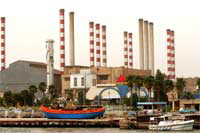 Reuters: Central bank officials from India and Iran were due to meet on Friday to try to keep their oil trade running, with New Delhi aiming to balance its energy needs with global diplomatic interests.
Reuters: Central bank officials from India and Iran were due to meet on Friday to try to keep their oil trade running, with New Delhi aiming to balance its energy needs with global diplomatic interests.
By Nidhi Verma and C.J. Kuncheria
 NEW DELHI, Dec 31 (Reuters) – Central bank officials from India and Iran were due to meet on Friday to try to keep their oil trade running, with New Delhi aiming to balance its energy needs with global diplomatic interests.
NEW DELHI, Dec 31 (Reuters) – Central bank officials from India and Iran were due to meet on Friday to try to keep their oil trade running, with New Delhi aiming to balance its energy needs with global diplomatic interests.
Indian officials and traders were hopeful of a quick resolution to a payments row that could disrupt about 13 percent of its oil imports and leave refiners scrambling for expensive alternative sources of crude.
The Reserve Bank of India (RBI) said last week that oil trade payments to Iran could no longer be settled using a long-standing clearinghouse system run by regional central banks, and Tehran has refused to sell oil outside the old set-up. This week the RBI extended the move to apply to all current account transactions.
“We are extremely hopeful that this impasse will be resolved shortly as Indian companies every week get crude supplies from Iran,” B. Mukherjee, head of finance at state-run Hindustan Petroleum Corp , told Reuters.
Other importers of Iranian crude include state-run Indian Oil Corp and Mangalore Refinery and Petrochemicals Ltd and privately-run Essar Oil .
The meeting was scheduled to take place at RBI headquarters in India’s financial centre, Mumbai.
The White House, which wants governments to stop dealing with Iran because of its nuclear programme, has praised the move, which came less than two months after President Barack Obama’s trip to India, where he pledged to help boost New Delhi’s global role.
U.N. sanctions on Iran do not cover oil sales.
ALTERNATIVES
India and Iran could agree to settle deals in Iran’s rial or another currency such as the Japanese yen, Indian Oil Secretary S. Sundareshan suggested on Thursday.
South Korea pays for Iranian crude using the won.
Payments could also be routed through a third-country central or commercial bank.
An economy growing at about 9 percent a year has made India the world’s fourth-largest importer of crude. Iran is its second largest supplier after Saudi Arabia.
Indian oil importers get 90 days credit for payment so they are covered for old transactions, but future shipments are in jeopardy if the matter is not resolved.
“For getting vessels next week, we have to enter in a transaction. How will we do that?” an oil industry executive said.
“NIOC (National Iranian Oil Co) cannot raise a bill because we have no backing. Supplies will be disrupted. So a solution has to be there and I hope today something will happen.”
India buys about 400,000 barrels per day of Iranian crude, sending roughly $12 billion a year to Tehran via the Asian Clearing Union, a system created in the 1970s by central banks in South Asia and Iran to clear trade payments between them.
Critics say the scheme is opaque to the monitoring of flows into Iranian organisations against which the United States has sanctions, as settlements are made on a net basis every two months.
Suspending Iranian imports when global crude prices are at near two-year highs and when Indian inflation is uncomfortably high would be costly for India.
India and Iran have long-standing ties but analysts say irritants and a new strategic thinking are prompting New Delhi to adopt a more nuanced and assertive policy.
New Delhi’s interests are increasingly tied with the United States, and it is also mindful of Arab concerns over Iran’s nuclear ambitions.
“When it comes to Iran, India can ignore pressure from the U.S. and noises from Israel, but it cannot ignore concerns from the Arab countries,” said P.R. Kumaraswamy, head of West Asian studies at New Delhi’s Jawaharlal Nehru University.
“In a very subtle way, India is sending a message that its closeness with Iran will not affect relations with other Middle Eastern countries.” (Writing by C.J. Kuncheria; Editing by Tony Munroe)


